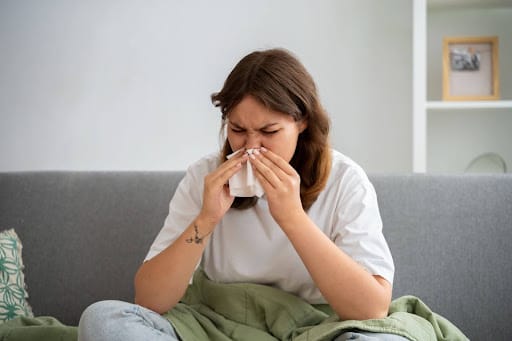As the seasons change, our bodies must adapt to new environmental conditions, which can bring various health challenges. One of the most common seasonal challenges is dealing with allergies. Whether it’s springtime pollen or fall mold spores, allergies can significantly impact our well-being. This comprehensive guide on Seasonal Health Tips aims to provide you with valuable insights and practical advice to stay healthy during allergy season.
The Importance of Seasonal Health Tips
Understanding and implementing Seasonal Health Tips can make a significant difference in how we handle the changing seasons. Seasonal changes can bring about a variety of health issues, from allergies to bacterial infections. By being proactive and following specific health tips, you can maintain your health and prevent common seasonal ailments.
Common Seasonal Allergies and Their Triggers
Seasonal allergies, also known as hay fever or allergic rhinitis, are caused by allergens that are more prevalent during certain times of the year. Common triggers include:
- Pollen: Trees, grasses, and weeds release pollen into the air, causing spring and summer allergies.
- Mold: Mold spores can become airborne in the fall and spring, leading to allergic reactions.
- Dust Mites: These tiny creatures thrive in warm, humid environments and can be problematic year-round but often worsen in the fall.
- Animal Dander: Pets shed dander, which can trigger allergies at any time, but more time spent indoors during colder months can increase exposure.
Health Tips in Summer Season
The summer season brings its own set of health challenges, especially when it comes to allergies and staying cool. Here are some essential health tips in summer season to keep you healthy and allergy-free:
- Stay Hydrated: Drinking plenty of water helps to keep your body cool and flushes out toxins. Proper hydration is crucial for maintaining energy levels and overall health during the hot summer months.
- Use Air Conditioning: Keeping windows closed and using air conditioning can help reduce the amount of pollen and mold spores entering your home. Make sure to change air filters regularly to maintain clean air circulation.
- Shower After Being Outdoors: Pollen can stick to your skin and hair, so it’s essential to shower and change clothes after spending time outside. This helps reduce the amount of pollen you bring into your home.
- Wear Sunglasses and Hats: Protect your eyes and face from pollen by wearing sunglasses and hats when you go outside. This can help reduce the severity of your allergy symptoms.
Summer Season Health Tips for Allergies
During the summer season, allergens such as pollen and mold spores are at their peak. Here are some summer season health tips specifically for managing allergies:
- Monitor Pollen Counts: Stay informed about daily pollen counts by checking local weather reports. Plan outdoor activities when pollen levels are lower, typically in the early morning or late evening.
- Keep Indoor Air Clean: Use high-efficiency particulate air (HEPA) filters in your home to trap allergens. Regularly clean and vacuum your home to reduce the accumulation of dust and pollen.
- Limit Outdoor Activities: On high pollen days, limit your time spent outdoors. If you need to be outside, consider wearing a mask to filter out allergens.
- Natural Remedies: Consider using natural remedies such as saline nasal sprays or neti pots to clear your nasal passages of allergens. Herbal teas like peppermint and nettle can also provide relief from allergy symptoms.
Allergy Relief Tips
Allergies can be a significant source of discomfort, but there are several allergy relief tips that can help manage and reduce symptoms:
- Over-the-Counter Medications: Antihistamines, decongestants, and nasal sprays can provide relief from allergy symptoms. Consult with your healthcare provider to find the best option for you.
- Stay Indoors During Peak Allergy Times: Pollen counts are usually highest during the morning hours. Try to stay indoors during these times to minimize exposure.
- Keep Windows Closed: Keeping windows closed, especially during peak allergy seasons, can help prevent allergens from entering your home. Use air conditioning instead to stay cool.
- Use Allergy-Proof Bedding: Encase pillows, mattresses, and box springs in allergy-proof covers to reduce exposure to dust mites and other allergens.
- Consult an Allergist: If over-the-counter medications and lifestyle changes are not enough, consider consulting an allergist. They can provide personalized treatment options, including allergy shots (immunotherapy).
Tips for Allergy Relief at Home
Creating an allergen-free environment at home is crucial for managing allergies effectively. Here are some tips for allergy relief in your living space:
- Regular Cleaning: Dust and vacuum your home regularly, using a vacuum cleaner with a HEPA filter to trap allergens.
- Reduce Humidity: Use a dehumidifier to keep indoor humidity levels below 50%, which helps prevent mold growth.
- Wash Bedding Weekly: Wash your bedding in hot water at least once a week to eliminate dust mites.
- Remove Carpets: If possible, replace carpets with hard flooring, such as wood or tile, which are easier to clean and do not trap allergens.
- Pet Care: Bathe pets regularly to reduce dander and keep them out of bedrooms to minimize exposure while you sleep.
Seasonal Allergy Relief Tips
Seasonal allergies can be challenging, but with the right strategies, you can manage your symptoms effectively. Here are some seasonal allergy relief tips to help you stay comfortable:
- Allergy-Proof Your Home: Create a safe haven by allergy-proofing your home. This includes using allergen-proof covers, cleaning regularly, and maintaining optimal humidity levels.
- Shower and Change Clothes: After spending time outside, shower and change your clothes to remove pollen and other allergens from your skin and hair.
- Use Saline Nasal Rinses: Rinse your nasal passages with saline solution to remove allergens and reduce inflammation.
- Take Probiotics: Probiotics can help balance your gut microbiome and strengthen your immune system, potentially reducing allergy symptoms.
- Try Acupuncture: Some studies suggest that acupuncture can help relieve allergy symptoms by reducing inflammation and balancing the body’s immune response.
Effects of Bacterial Infection During Allergy Season
Allergy season can weaken the immune system, making it easier for bacterial infections to take hold. Understanding the effects of bacterial infection during allergy season can help you take preventative measures and seek appropriate treatment.
- Sinus Infections: Allergies can cause inflammation and blockage in the sinuses, leading to bacterial infections. Symptoms include facial pain, pressure, and thick nasal discharge.
- Respiratory Infections: Allergens can irritate the respiratory tract, making it more susceptible to bacterial infections such as bronchitis or pneumonia.
- Ear Infections: Allergies can cause fluid buildup in the ears, creating an environment for bacteria to thrive and leading to painful ear infections.
- Exacerbation of Chronic Conditions: Individuals with chronic respiratory conditions, such as asthma or COPD, may experience worsening symptoms due to bacterial infections during allergy season.
Preventing Bacterial Infections
To prevent bacterial infections during allergy season, follow these preventative measures:
- Maintain Good Hygiene: Wash your hands regularly, especially after being outside or touching surfaces that may harbor bacteria.
- Stay Hydrated: Drinking plenty of fluids helps keep your mucous membranes moist, reducing the risk of infection.
- Avoid Touching Your Face: This can transfer bacteria from your hands to your nose, mouth, and eyes, increasing the risk of infection.
- Use a Humidifier: Keep indoor air moist to prevent dry nasal passages and throat, which can make you more susceptible to infections.
- Seek Medical Attention: If you develop symptoms of a bacterial infection, such as fever, severe pain, or persistent cough, seek medical attention promptly.
Staying Healthy During Allergy Season
By following these Seasonal Health Tips, you can effectively manage your allergies and stay healthy throughout the year. Remember to:
- Monitor Pollen Counts: Stay informed about daily pollen counts and adjust your outdoor activities accordingly.
- Keep Your Home Allergen-Free: Regular cleaning and maintenance can significantly reduce indoor allergens.
- Consult Healthcare Providers: Seek professional advice for managing severe allergies and preventing complications.
- Implement Lifestyle Changes: Small changes in your daily routine can make a big difference in managing allergy symptoms.
Conclusion
Seasonal health tips are essential for staying healthy during allergy season. By following practical advice and making informed choices, you can manage your allergy symptoms and prevent common seasonal ailments. For those in need of expert medical care, Urgent Care of Texas is here to provide the highest quality care and support your health journey. Visit one of our convenient locations in Arlington, Burleson, and Plano, Texas, and experience compassionate, innovative healthcare tailored to your needs.
Disclaimer: Please note that the content presented in this blog serves solely for educational purposes and should not be interpreted as medical advice. For personalized diagnosis and treatment options, it is advisable to seek guidance from a qualified healthcare professional.







